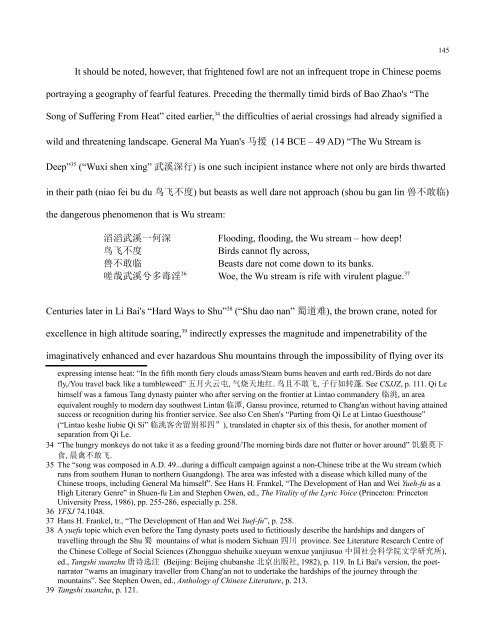View/Open - University of Victoria
View/Open - University of Victoria
View/Open - University of Victoria
Create successful ePaper yourself
Turn your PDF publications into a flip-book with our unique Google optimized e-Paper software.
It should be noted, however, that frightened fowl are not an infrequent trope in Chinese poems<br />
portraying a geography <strong>of</strong> fearful features. Preceding the thermally timid birds <strong>of</strong> Bao Zhao's “The<br />
Song <strong>of</strong> Suffering From Heat” cited earlier, 34 the difficulties <strong>of</strong> aerial crossings had already signified a<br />
wild and threatening landscape. General Ma Yuan's 马 援 (14 BCE – 49 AD) “The Wu Stream is<br />
Deep” 35 (“Wuxi shen xing” 武 溪 深 行 ) is one such incipient instance where not only are birds thwarted<br />
in their path (niao fei bu du 鸟 飞 不 度 ) but beasts as well dare not approach (shou bu gan lin 兽 不 敢 临 )<br />
the dangerous phenomenon that is Wu stream:<br />
滔 滔 武 溪 一 何 深 Flooding, flooding, the Wu stream – how deep!<br />
鸟 飞 不 度<br />
Birds cannot fly across,<br />
兽 不 敢 临<br />
Beasts dare not come down to its banks.<br />
36<br />
嗟 哉 武 溪 兮 多 毒 淫 Woe, the Wu stream is rife with virulent plague. 37<br />
145<br />
Centuries later in Li Bai's “Hard Ways to Shu” 38 (“Shu dao nan” 蜀 道 难 ), the brown crane, noted for<br />
excellence in high altitude soaring, 39 indirectly expresses the magnitude and impenetrability <strong>of</strong> the<br />
imaginatively enhanced and ever hazardous Shu mountains through the impossibility <strong>of</strong> flying over its<br />
expressing intense heat: “In the fifth month fiery clouds amass/Steam burns heaven and earth red./Birds do not dare<br />
fly,/You travel back like a tumbleweed” 五 月 火 云 屯 , 气 烧 天 地 红 . 鸟 且 不 敢 飞 , 子 行 如 转 蓬 . See CSJJZ, p. 111. Qi Le<br />
himself was a famous Tang dynasty painter who after serving on the frontier at Lintao commandery 临 洮 , an area<br />
equivalent roughly to modern day southwest Lintan 临 潭 , Gansu province, returned to Chang'an without having attained<br />
success or recognition during his frontier service. See also Cen Shen's “Parting from Qi Le at Lintao Guesthouse”<br />
(“Lintao keshe liubie Qi Si” 临 洮 客 舍 留 别 祁 四 ”), translated in chapter six <strong>of</strong> this thesis, for another moment <strong>of</strong><br />
separation from Qi Le.<br />
34 “The hungry monkeys do not take it as a feeding ground/The morning birds dare not flutter or hover around” 饥 猿 莫 下<br />
食 , 晨 禽 不 敢 飞 .<br />
35 The “song was composed in A.D. 49...during a difficult campaign against a non-Chinese tribe at the Wu stream (which<br />
runs from southern Hunan to northern Guangdong). The area was infested with a disease which killed many <strong>of</strong> the<br />
Chinese troops, including General Ma himself”. See Hans H. Frankel, “The Development <strong>of</strong> Han and Wei Yueh-fu as a<br />
High Literary Genre” in Shuen-fu Lin and Stephen Owen, ed., The Vitality <strong>of</strong> the Lyric Voice (Princeton: Princeton<br />
<strong>University</strong> Press, 1986), pp. 255-286, especially p. 258.<br />
36 YFSJ 74.1048.<br />
37 Hans H. Frankel, tr., “The Development <strong>of</strong> Han and Wei Yuef-fu”, p. 258.<br />
38 A yuefu topic which even before the Tang dynasty poets used to fictitiously describe the hardships and dangers <strong>of</strong><br />
travelling through the Shu 蜀 mountains <strong>of</strong> what is modern Sichuan 四 川 province. See Literature Research Centre <strong>of</strong><br />
the Chinese College <strong>of</strong> Social Sciences (Zhongguo shehuike xueyuan wenxue yanjiusuo 中 国 社 会 科 学 院 文 学 研 究 所 ),<br />
ed., Tangshi xuanzhu 唐 诗 选 注 (Beijing: Beijing chubanshe 北 京 出 版 社 , 1982), p. 119. In Li Bai's version, the poetnarrator<br />
“warns an imaginary traveller from Chang'an not to undertake the hardships <strong>of</strong> the journey through the<br />
mountains”. See Stephen Owen, ed., Anthology <strong>of</strong> Chinese Literature, p. 213.<br />
39 Tangshi xuanzhu, p. 121.
















